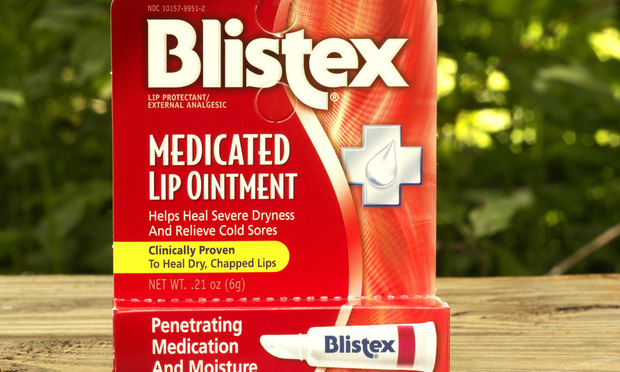Daily Dicta: Drumroll Please …The Top 10 Most Ridiculous Lawsuits of 2019
The U.S. Chamber Institute for Legal Reform picks the worst lawsuits of 2019.
December 19, 2019 at 01:06 AM
5 minute read
 A box of Blistex brand medicated lip ointment.
A box of Blistex brand medicated lip ointment.
Forget lighting advent candles or trimming the tree—one of my favorite holiday traditions is the U.S. Chamber Institute for Legal Reform annual list of the year's Top 10 Most Ridiculous Lawsuits.
I still firmly believe that the worst lawsuit of 2019 was filed by the guy who sued his ex-girlfriend for $225,000 because she broke up with him. But since Syed Husain's claim has nothing to do with tort reform, it wasn't on the ILR's radar.
Instead, the ILR's pick for most frivolous lawsuit of the year is a putative class action against Blistex Inc. that claims the lip balm's packaging is deceptive.
Plaintiff Heather Erwin complains that Blistex packaging states that the product contains .15 ounces of lip balm, but 11% of it is actually stuck to the bottom.
 That last bit "cannot by applied without taking apart the Blistex Stick, digging the Lip Balm out of the product packaging, and applying it with fingers," according to the complaint, which was filed in St. Clair County, Illinois circuit court by David C. Nelson of Nelson & Nelson in Belleville, Illinois and Matthew H. Armstrong of the Armstrong Law Firm in St. Louis, Missouri, according to the Madison-St. Clair Record.
That last bit "cannot by applied without taking apart the Blistex Stick, digging the Lip Balm out of the product packaging, and applying it with fingers," according to the complaint, which was filed in St. Clair County, Illinois circuit court by David C. Nelson of Nelson & Nelson in Belleville, Illinois and Matthew H. Armstrong of the Armstrong Law Firm in St. Louis, Missouri, according to the Madison-St. Clair Record.
This was "not what plaintiff and class members bargained for when they chose to purchase the stick over other packaging."
What makes the suit especially stupid (which the ILR doesn't point out) is that another woman already sued Blistex in Illinois federal court, asserting more or less the same claims under the same statute, the Illinois Consumer Fraud and Deceptive Business Practices Act.
As far as I can tell, the main difference between the suits is that the first plaintiff, Alana Hillen, complained about Blistex in a squeezable tube rather than a stick.
U.S. District Judge Elaine Bucklo curtly dismissed the suit in 2017—and her rationale would seem equally applicable here.
"Plaintiff tacitly concedes that consumers expect some amount of product to remain in the tube," Bucklo wrote. "Indeed, as other courts have observed, consumers are generally aware that they may not be able to extract every bit of common products such as 'toothpaste, peanut butter, shampoo, and many other products' from their packaging. Put simply, plaintiff's disappointment in defendant's tube design does not establish deception, nor does it transform defendant's accurate labeling of the product's net weight into fraud by omission."
As for trying to extract that last bit of balm with your fingers, that's up to the consumer. "That plaintiff views that solution as 'messy,' 'inconvenient,' or otherwise undesirable does not render defendant's tube design unfair or deceptive," the judge wrote.
Nelson did not return a call seeking comment and Armstrong could not be reached for comment.
I'm partial to the number two entry on the ILR's list of shame—"Trial Lawyers' Expert Witness Falls Apart on the Stand" —since it seems to be based on one of my columns, How Wilkinson Walsh + Eskovitz Partners Shredded Witnesses in $600M Save for Bayer.
In February, I wrote about a $600 million consumer class action that alleged Bayer AG made false and misleading claims that its One A Day multivitamin supported heart health, immunity and physical energy.
Armed with hundreds of pages of trial transcripts, I dissected the way Wilkinson Walsh + Eskovitz name partner Sean Eskovitz destroyed the plaintiffs' expert on cross examination, getting the doctor to admit that both he and his wife take multi-vitamins and that the vitamins and minerals in One A Day do help support heart health, immune health and physical energy.
Here's how the ILR summed it up: The expert "was supposed to help them make the case that there are no health benefits to the daily vitamin. But their claims fall apart in the hands of their key witness… As you might imagine, this $600 million class action lawsuit was barely on life support after the doctor all but admitted the plaintiffs' lawyers had no case."
That said, I don't think it's fair to call the case frivolous—it survived a motion to dismiss and was certified as a class by U.S. District Judge William Orrick in San Francisco. I credit skilled lawyering by Eskovitz and his law partner Alexandra Walsh for the decisive win.
Be sure to check out the ILR's cartoon video of the cross, where Eskovitz is depicted like some chisel-jawed legal superhero in a well-tailored suit.
Here's the rest of the ILR's list:
Trial Lawyers Have a Cow Over Vegan Butter Labeling (Brooklyn, New York)
Woman Sues New York City Over "Scary" Poster Promoting Dexter (New York, New York
California Coffee House Sued Over Warning Labels (Pasadena, California)
Customer Sues Friendly's Ice Cream Over Vanilla Ingredients (Brooklyn, New York)
NBA Player's Lawyers Tried to Game the System (New Orleans, Louisiana)
Gamer Sues Fortnite Over Dance Competition Entry (Los Angeles, California
Dog Owner Gets Sued for Online Review (DeLand, Florida)
Man Sues Godiva over Labeling (Washington, DC)
This content has been archived. It is available through our partners, LexisNexis® and Bloomberg Law.
To view this content, please continue to their sites.
Not a Lexis Subscriber?
Subscribe Now
Not a Bloomberg Law Subscriber?
Subscribe Now
NOT FOR REPRINT
© 2025 ALM Global, LLC, All Rights Reserved. Request academic re-use from www.copyright.com. All other uses, submit a request to [email protected]. For more information visit Asset & Logo Licensing.
You Might Like
View All
Firms Come Out of the Gate With High-Profile Litigation Hires in 2025

2024 Marked Growth On Top of Growth for Law Firm Litigation Practices. Is a Cooldown in the Offing for 2025?

Big Company Insiders See Technology-Related Disputes Teed Up for 2025

Litigation Leaders: Jason Leckerman of Ballard Spahr on Growing the Department by a Third Via Merger with Lane Powell
Trending Stories
- 1Uber Files RICO Suit Against Plaintiff-Side Firms Alleging Fraudulent Injury Claims
- 2The Law Firm Disrupted: Scrutinizing the Elephant More Than the Mouse
- 3Inherent Diminished Value Damages Unavailable to 3rd-Party Claimants, Court Says
- 4Pa. Defense Firm Sued by Client Over Ex-Eagles Player's $43.5M Med Mal Win
- 5Losses Mount at Morris Manning, but Departing Ex-Chair Stays Bullish About His Old Firm's Future
Who Got The Work
J. Brugh Lower of Gibbons has entered an appearance for industrial equipment supplier Devco Corporation in a pending trademark infringement lawsuit. The suit, accusing the defendant of selling knock-off Graco products, was filed Dec. 18 in New Jersey District Court by Rivkin Radler on behalf of Graco Inc. and Graco Minnesota. The case, assigned to U.S. District Judge Zahid N. Quraishi, is 3:24-cv-11294, Graco Inc. et al v. Devco Corporation.
Who Got The Work
Rebecca Maller-Stein and Kent A. Yalowitz of Arnold & Porter Kaye Scholer have entered their appearances for Hanaco Venture Capital and its executives, Lior Prosor and David Frankel, in a pending securities lawsuit. The action, filed on Dec. 24 in New York Southern District Court by Zell, Aron & Co. on behalf of Goldeneye Advisors, accuses the defendants of negligently and fraudulently managing the plaintiff's $1 million investment. The case, assigned to U.S. District Judge Vernon S. Broderick, is 1:24-cv-09918, Goldeneye Advisors, LLC v. Hanaco Venture Capital, Ltd. et al.
Who Got The Work
Attorneys from A&O Shearman has stepped in as defense counsel for Toronto-Dominion Bank and other defendants in a pending securities class action. The suit, filed Dec. 11 in New York Southern District Court by Bleichmar Fonti & Auld, accuses the defendants of concealing the bank's 'pervasive' deficiencies in regards to its compliance with the Bank Secrecy Act and the quality of its anti-money laundering controls. The case, assigned to U.S. District Judge Arun Subramanian, is 1:24-cv-09445, Gonzalez v. The Toronto-Dominion Bank et al.
Who Got The Work
Crown Castle International, a Pennsylvania company providing shared communications infrastructure, has turned to Luke D. Wolf of Gordon Rees Scully Mansukhani to fend off a pending breach-of-contract lawsuit. The court action, filed Nov. 25 in Michigan Eastern District Court by Hooper Hathaway PC on behalf of The Town Residences LLC, accuses Crown Castle of failing to transfer approximately $30,000 in utility payments from T-Mobile in breach of a roof-top lease and assignment agreement. The case, assigned to U.S. District Judge Susan K. Declercq, is 2:24-cv-13131, The Town Residences LLC v. T-Mobile US, Inc. et al.
Who Got The Work
Wilfred P. Coronato and Daniel M. Schwartz of McCarter & English have stepped in as defense counsel to Electrolux Home Products Inc. in a pending product liability lawsuit. The court action, filed Nov. 26 in New York Eastern District Court by Poulos Lopiccolo PC and Nagel Rice LLP on behalf of David Stern, alleges that the defendant's refrigerators’ drawers and shelving repeatedly break and fall apart within months after purchase. The case, assigned to U.S. District Judge Joan M. Azrack, is 2:24-cv-08204, Stern v. Electrolux Home Products, Inc.
Featured Firms
Law Offices of Gary Martin Hays & Associates, P.C.
(470) 294-1674
Law Offices of Mark E. Salomone
(857) 444-6468
Smith & Hassler
(713) 739-1250






